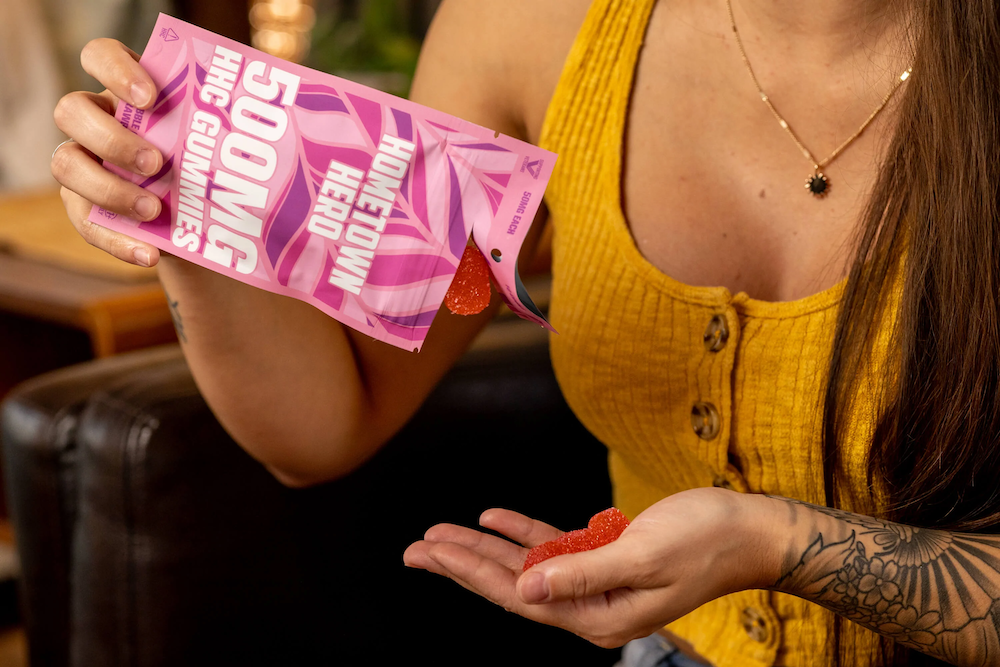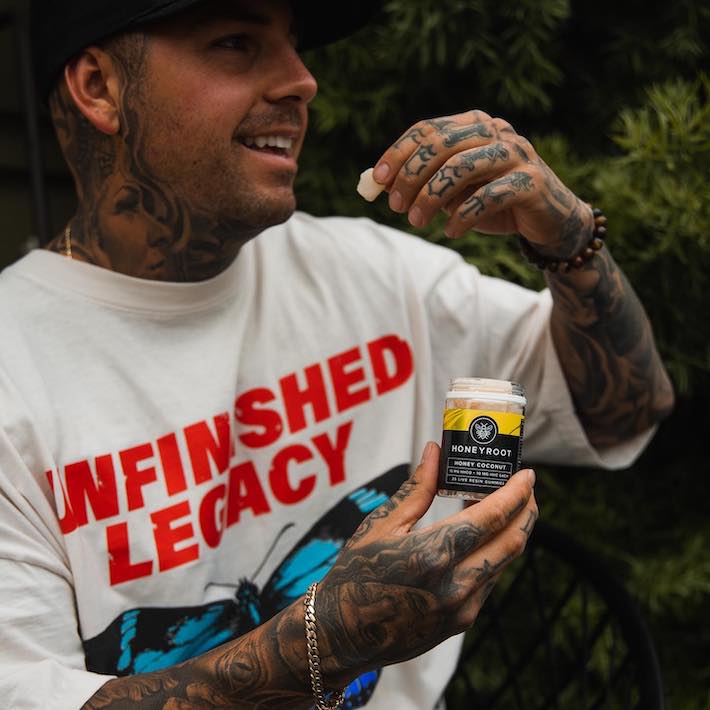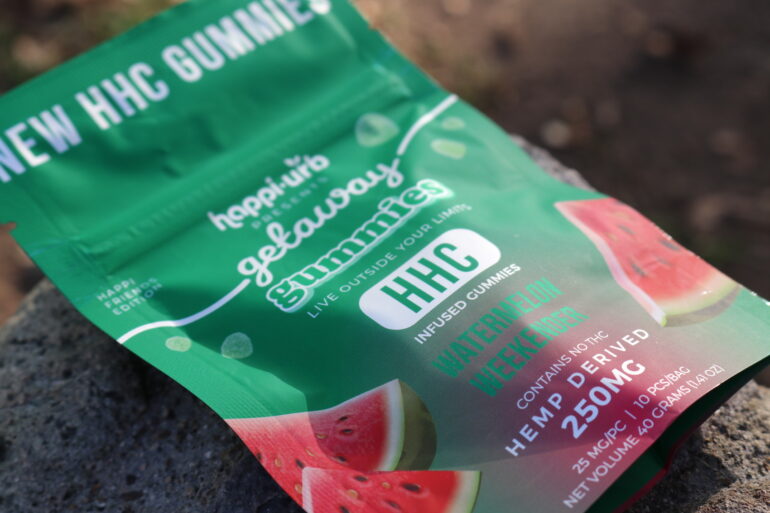Hexahydrocannabinol (HHC) is an intoxicating cannabis compound that does get you high. Its effects are less potent than delta-9 THC, inducing mild euphoria and relaxation in small-to-medium doses.
HHC is a great cannabinoid for beginner users who want to experience a subtle yet noticeable high. Experienced users can mix HHC with delta-8 THC for stronger, more intense euphoric effects — a small dose of CBD can also provide gentle relaxation. It’s important to note that HHC likely causes a positive or false positive drug reading, so make sure you have no upcoming drug tests.
Key takeaways:
- HHC is an intoxicating natural or semi-synthetic cannabinoid that does get you high. It’s weaker than delta-8 and delta-9 and is suitable for beginner users. We recommend a 10 mg dose first.
- HHC’s effects can include mild euphoria, relaxation, and physical sensations in small and medium doses (1-10 mg). Larger doses (10+ mg) can cause stronger effects and a higher risk of negative short-term side effects such as anxiety, paranoia, and physical discomfort. Some users might also experience memory loss, nausea, and sickness.
- Very few research papers exist on HHC’s benefits. However, two HHC analogs (LYR-7 and LYR-8) promote anti-proliferation and helped reduce tumor growth. HHC likely has the same benefits as delta-9 and delta-8 due to its molecular similarity and ability to bind to CB1 receptors.
- The onset of HHC effects is 5-10 minutes via smoking or vaping HHC and up to 60 minutes via oral consumption e.g. HHC gummies. Effects from smoking or vaping HHC products can last up to four hours and oral consumption up to six hours.
- HHC likely triggers a positive or false-positive drug test result due to product contamination or HHC metabolite similarity with delta-9 metabolites. HHC detox is impossible. You cannot completely remove HHC from your fat cells.
Does HHC Get You High?

Yes, HHC does get you high. It’s an intoxicating cannabinoid and homolog of delta-9, meaning they have almost identical molecular structures and can activate your endocannabinoid system’s cannabinoid receptors, specifically cannabinoid 1 (CB1). However, HHC has a weaker CB1 binding affinity than delta-9, making it a more suitable option for beginner users.
HHC’s CB1 activatory behavior causes a release of special neurotransmitters (endocannabinoids) in your brain. Endocannabinoids are chemical messengers that transmit signals from nerve cells (neurons) to target cells. This activity is responsible for regulating several biological processes, such as mood, sleep, pain, memory, and other benefits, and disrupts several mental and physical functions.
THC’s activity in your brain’s cerebellum and basil ganglia can cause balance, coordination, and reaction time challenges. Likewise, THC receptor binding in the hippocampus induces short-term memory loss, and the low presence of CB1 receptors in the brain stem nuclei could account for minimal toxicity when consumed in overdose.
Is HHC Stronger than THC?
HHC is likely less potent than THC with a weaker CB1 binding affinity. Research shows that the structurally similar HHC analog 9-hydroxyhexahydrocannabinol (9-OH-HHC) is roughly 10-25 times less potent than delta-9.
RELATED: HHC vs THC: What’s the Difference?
Anecdotal evidence from users online suggests that an HHC high and its related effects are 70-80% weaker than those associated with delta-9. However, these weaker effects don’t mean you can eat a whole packet of HHC gummies in one sitting. You will still experience a high — maybe even an uncomfortable one.
What is HHC?
HHC is short for hexahydrocannabinol, a naturally-occurring minor cannabinoid present in cannabis, including hemp and marijuana. Producers can also synthesize HHC through THC hydrogenation, a method where high pressure, molecular hydrogen, and a catalyst such as nickel or platinum combine to make a chemical reaction. This reaction causes THC’s double to break and become unstable. Introducing hydrogen restabilizes its molecular structure and makes it more resistant to heat and UV light. Renowned cannabis scientist Roger Adams was the first to synthesize HHC in 1947. Researchers have proven that HHC is a degradation byproduct of THC.
RELATED: What Is HHC and What Are Its Effects?
How Does HHC Make You Feel?

How HHC makes you feel is purely subjective. Some users report mild euphoria, physical relaxation, and mental focus. In contrast, other users report sedation and sleepiness. Higher doses above your tolerance level can induce negative but non-life-threatening side effects such as anxiety, stress, memory loss, and sickness in rare cases. These side effects are why we always recommend you start with the lowest dose, especially if you’re a beginner user.
CBD Oracle recently collected data on its readers who use HHC, and the responses were mixed.
One reader claims HHC “hits quicker” with more “Sativa-like” effects. Cannabis folklore on the internet states that common Sativas produce a “mind high” with effects that include sedation, couch-lock, anxiety reduction, and relaxation. However, another reader states that HHC promotes “clear-mindedness”, positive euphoric sensations, and energy. These effects are often associated with Indica cannabis strains.
One constant among HHC users is it gives them a more subtle and less intrusive high without too much anxiety or paranoia.
How Long Does an HHC High Last?
An HHC high lasts between 2-6 hours, roughly the same as a delta-9 and delta-8. Several factors affect the duration of your high, including dose, dosing method, metabolic rate, and body fat percentage.
Suppose you smoke an HHC flower product. The onset of effects is approximately 5-10 minutes and can last up to four hours. Conversely, HHC gummies take up to 60 minutes and can last up to six hours (sometimes more).
This change in the onset of effects and duration of your high largely depends on how the body absorbs HHC.
HHC gummies travel through your digestive system and absorb through your intestinal walls, eventually entering your bloodstream and metabolizing via your liver. HHC is then redistributed back into your bloodstream after the metabolization process. Food intake and how much sustenance exists in your stomach affect HHC absorption. The more food in your belly, the slower the absorption rate.
On the other hand, HHC flower enters your bloodstream through tiny air sacs that line your lungs, bypassing the digestive system altogether and causing a quicker onset of effects. Research shows that HHC and other THC isomers take 10-20 seconds to travel from the lungs to the brain.
How Much HHC Should You Take?
Even though HHC is weaker than delta-9, beginner cannabis users should take as little HHC as possible. The reason for this caution is you simply don’t know how a cannabinoid will react in your body.
We recommend roughly 2-5 mg to start with. If the effects aren’t noticeable, wait an hour and consume a milligram or two. If you’re an experienced cannabis user, we recommend a starting dose of anywhere between 10-25 mg. If you feel very few effects, try another 5 mg an hour or two following the first dose. If you want to get super high, anything above 25 mg is optimal, but not recommended. A dose higher than 25 mg might be too potent. Remember: Start low, go slow.
What Are HHC’s Benefits?
Aside from a subtle but noticeable high that’s suitable for beginner cannabis users, what are HHC’s benefits? HHC potentially has quite a few, many of which are likely similar to delta-9 and other THC isomers due to activating your endocannabinoid system’s CB1 receptors. These benefits could include pain relief, sleep promotion, appetite stimulation, and stress reduction.
Preclinical research shows that the synthetic HHC analogs LYR-7 and LYR-8 significantly reduced tumor growth in mice test subjects, preventing the formation of new blood vessels and reducing cancer cell growth.
Will HHC Show Up on a Drug Test?
HHC might cause a positive or false-positive drug test result. Users on Reddit and other social sites claim a standard drug test detected HHC in their bodies, thus resulting in a positive reading. However, other users have had a different experience and didn’t fail a drug test after HHC consumption.
The science behind HHC and a failed drug test result aren’t conclusive, but we can safely assume HHC products will likely trigger a positive or false-positive reading for two reasons:
1) HHC metabolites are similar to those produced by delta-9 THC.
Drug tests screen for the delta-9 metabolites 11-nor-delta-9-tetrahydrocannabinol-9-carboxylic acid (9-carboxy-THC) and 11-hydroxy-delta-9-tetrahydrocannabinol (THC-OH). Studies show animal test subject liver microsomes metabolize an HHC isomer into the metabolite 11-hydroxy-hexahydrocannabinol (11-OH-HHC), a minor delta-9 metabolite. Since delta-9 and HHC metabolize into 11-OH-HHC, drug tests might detect THC usage, resulting in a positive reading.
2) Cannabis producers can accidentally cross-contaminate their HHC products with delta-9.
Not all cannabis producers go the extra mile to ensure their HHC products are clean and fit for human consumption. Many low-budget dollar-chaser companies cut corners, especially during the production phase, resulting in higher incidences of cross-contamination with delta-9 THC, even when the label doesn’t state that THC is included in the HHC product. So, what happens when you consume these THC-contaminated HHC products? Well, you unknowingly consume varying quantities of THC. These quantities will likely cause a failed drug test.
Can You Detox HHC From Your System?
No. You cannot flush, remove or detox HHC from your system. Cranberry juice, green tea, special detox kits, and other related removal methods merely mask or hide HHC from drug tests.
Like delta-9, HHC is fat-soluble and stores itself in your adipose tissue (fatty tissue). Fatty tissue is composed of fat cells and is everywhere inside your body. Time and abstinence is the only way to remove HHC and other THC isomers from fat cells. Alternatively, you can always remove every inch of fatty tissue from your body, which is obviously impossible.
Can You Overdose on HHC?
There has never been a case of HHC or any other cannabis compound causing an overdose. However, some of HHC’s negative side effects can feel like you’re overdosing.
There have never been any overdose-related cases from taking HHC or other organic cannabis compounds. However, if you take too much HHC, it can make you anxious and paranoid. This anxiety and paranoia can make you fear an overdose or feel like you’re overdosing. It’s important to remember that these feelings are safe and not indicative of a heart attack or overdose.
Don’t consume more HHC if you’re experiencing anxiety, stress, or paranoia. Find a chair or bed in a dark, comfortable room and rest until the effects wear off. Take some CBD if you have any. CBD is a non-competitive negative allosteric modulator of CB1 receptors. This modulatory behavior means it partially or fully inhibits HHC and other THC isomers from binding to CB1, thus reducing a euphoric high. We recommend taking CBD before HHC dosing for a more relaxing experience.
Conclusion
We’ve discovered that HHC gets you high, so why not try it yourself? There are many HHC products available on the market. Some great, some not so great. We recommend giving HHC vape carts a go, they’re quick, easy, efficient, and effective at getting you high with a nice dose of relaxation and euphoria. If vaping isn’t your thing, no problem. We have a comprehensive list of the best HHC gummies on the market, all vetted by our expert review team.
